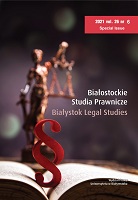The Universal Right to File Petitions as a Contemporary Challenge for Legal Studies
The Universal Right to File Petitions as a Contemporary Challenge for Legal Studies
Author(s): Magdalena Małecka-Łyszczek, Katarzyna Małysa-SulińskaSubject(s): Politics, Civil Society, Government/Political systems, EU-Legislation
Published by: Temida 2
Keywords: civil society; entities with the capacity to file petitions; formal requirements of petitions; participatory democracy; subject matter of the petition; the right to petition;
Summary/Abstract: The universality of the right to petition, in terms of both the broad specification of its subject matter and the group of entities entitled to petition, as well as the specification of the accessible formal requirements for filing petitions, is a challenge at the level of both lawmaking and applying the law. The need arises not only to ensure that an extensive group of entities has the opportunity to file a petition, but also to provide a guarantee that the petition will be processed and considered properly. The subject matter of this article is the analysis of the Polish legal regulations on this, as well as a review of the established practices of filing petitions with the Sejm and the Senate, as well as their comparison with the solutions applied in other countries. The findings indicate that this is a tool of a civil society commonly used in the European Union Member States. It should also be noted that the Polish solutions, as well as the practice of their application, are seen to be particularly targeted at increasing social activity and enabling the use of the potential that is inherent in the citizens, groups of citizens and all forms in which they can interact with each other.
Journal: Białostockie Studia Prawnicze
- Issue Year: 26/2021
- Issue No: 5
- Page Range: 141-160
- Page Count: 20
- Language: English

